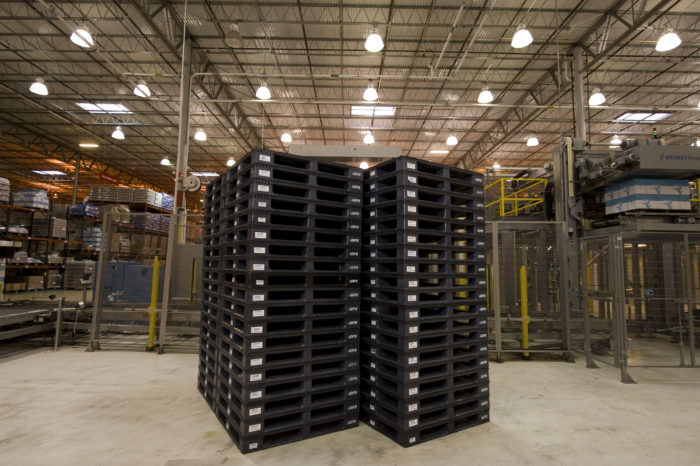Carbon emissions from a company’s supply chain are four times as high as those from direct company operations. That surprising statistic is driving some supply chain managers to look for ways they can reduce their carbon footprint. But the benefits of responsible supply chain management aren’t just environmental. Responsible business practices bring benefits like cost control, greater efficiency, and an improved reputation for companies. By switching to sustainable shipping, considering decentralized business models, and adopting plastic pallet pooling, responsible companies can cut their total cost of business (TCOB) and gain a competitive edge.
Three Benefits of Responsible Supply Chain Management
 Responsible business practices center on minimizing waste, improving fuel efficiency, reducing carbon emissions, and making overall business practices more environmentally friendly and more ethically sound. While the benefits of responsible supply chain management are limitless, for businesses they can be broken down to three main components:
Responsible business practices center on minimizing waste, improving fuel efficiency, reducing carbon emissions, and making overall business practices more environmentally friendly and more ethically sound. While the benefits of responsible supply chain management are limitless, for businesses they can be broken down to three main components:
- Reduced costs: By improving fuel efficiency, companies stand to reduce transportation costs and their carbon footprint. By focusing on ways to reduce energy consumption, they cut the costs of maintaining a warehouse. Just about every sustainability effort, whether in the supply chain or outside it, will have a positive long-term effect on costs.
- Greater efficiency: Responsible warehouse management supports an efficient circular business model that is focused on reusing and recycling. With reduced waste comes lower labor costs, as employees spend less time dealing with items that need to be thrown away, whether that means breaking down boxes, stripping items for parts, sorting pallets, or driving waste to a landfill.
- Improved reputation: With the rise of environmental, social, and governance investing will come an increased demand for company transparency from consumers, government entities, and lenders. By engaging in responsible practices now, supply chain managers can secure a reputation for sustainability in the future.
By establishing a strong reputation, minimizing waste, and cutting costs, supply chain managers can increase their flexibility and stay competitive. Many of the steps to implementing such practices are extremely practical and easy to manage.
Four Ways to Improve Supply Chain Sustainability
 Taking steps to improve supply chain sustainability is more about adjusting current company procedures than making drastic business changes. Many of these changes are possible in increments, making them easier for managers to successfully implement.
Taking steps to improve supply chain sustainability is more about adjusting current company procedures than making drastic business changes. Many of these changes are possible in increments, making them easier for managers to successfully implement.
- Decentralize warehouses and distribution centers: Several smaller warehouses and distribution centers tend to be much more sustainable than a large, central location. First, these smaller facilities reduce energy usage and cut back on urban sprawl. Also, they can be strategically placed in areas close to major shipping hubs, which minimizes transportation distances and conserves fuel.
- Switch to reusable shipping options: Instead of pallet wrap, slip sheets, and other wasteful single-use shipping materials, managers should consider more sustainable options to minimize natural resource consumption. Reusable shipping materials like plastic pallets, straps, and reusable pallet wraps reduce the risk of product damage during transportation and can be used over and over again.
- Optimize transportation routes: Supply chain managers can make freight more sustainable by improving route efficiency. Route planning software is a simple way to do this, as it will calculate the costs related to different travel scenarios, like heavy traffic, high elevations, gridlock, and other things that can increase fuel usage. Another option is a more old-fashioned method of analyzing travel endpoints and creating paths that connect them in a way that reduces trips and maximizes efficiency.
- Choose plastic pallet pooling: Plastic pallet pooling is a sustainable option for companies for many reasons. Plastic pallets are significantly lighter than their wood counterparts, which cuts back on fuel usage during transportation. Also, pooling companies, which rent their pallets, transfer pallets among customers by leveraging routes that ensure maximum fuel efficiency. When the plastic pallets in a pool are no longer usable (usually after 100 or so trips through the supply chain), they are ground down and recycled into “new” pallets. It’s an entirely circular, sustainable business model that makes the companies that use it greener by extension.
Pallet pooling simplifies logistics as it puts the pallet pooling provider in charge of pallet delivery and return.
Plastic pallet pooling is one of the best ways to make a supply chain both more responsible and profitable. By choosing a plastic pooling model, managers can minimize the cost of maintaining a pallet fleet while eliminating their dependence on heavier, less sustainable wood pallets. Pallet pooling simplifies logistics as it puts the pallet pooling provider in charge of pallet delivery and return. It’s a way to reduce the labor and hassle that go into managing a pallet fleet.
By choosing a plastic pallet pooling provider, managers can enjoy the benefits of responsible supply chain management, such as reduced costs, greater overall efficiency, and an improved company reputation. These are competitive advantages in a globalized environment where consumers demand corporate responsibility, and they are important steps for both corporate success and the health of the planet.
iGPS plastic pallets are rented through our pooling program to help your business enjoy the benefits of responsible supply chain management. We ensure our durable platforms never go to waste by recycling each one at the end of its long life. For more info, contact us at 1-800-884-0225, email a specialist at switch@igps.net, or visit our contact page.



